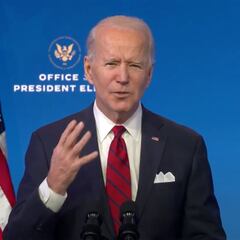Third stimulus check: could $1,400 payment arrive in January?
US President-elect Joe Biden has included a third stimulus check of up to $1,400 in the American Rescue Plan, his proposed $1.9tn coronavirus relief package.

A third stimulus check, this time for up to $1,400, is a part of the coronavirus relief bill proposed by US President-elect Joe Biden, who takes office on Wednesday.
$600 second stimulus check "simply not enough" - Biden
The $1,400 amount represents the difference between the $600 second stimulus check included in December’s $900bn covid-19 aid package and the $2,000 figure Democrats unsuccessfully sought to raise this to.
"We will finish the job of getting a total of $2,000 in cash relief to people who need it the most," Biden said as he presented the $1.9tn American Rescue Plan (ARP) on Thursday. "The $600 already appropriated is simply not enough if you have to choose between paying rent and putting food on the table. Even for those who have kept their jobs, these checks are really important.”
The Democrat added: "$2,000 is going to go a long way to ease that pain."
Biden's stimulus plan also seeks support measures such as a $400 weekly boost to jobless benefits and an increase in the national minimum wage to $15 an hour.
Could Americans get their third stimulus check in January?
No, it seems very unlikely that the proposed $1,400 stimulus check will start being distributed, or even be approved, before the end of January. This is because the stimulus bill in which it features may well take a little time to get through Congress, with the Senate shaping up as a particular stumbling block.
Stimulus bill expected to require bipartisan negotiation before passing
Though slimmer than before, the Democrats’ 222-211 majority in the House of Representatives leaves them better-placed to push the bill through the lower chamber than the Senate, where they may have wrested back control from the Republicans but hold only a wafer-thin advantage.
Jon Ossoff and Raphael Warnock’s wins in this month’s run-off elections in Georgia mean the Senate is now a 50-50 split, with Democratic Vice-President-elect Kamala Harris given a tie-breaking vote - but a filibuster-proof 60 votes may well be needed to pass the ARP, rather than a simple majority.
Democrats could try to pass it using a process called budget reconciliation, which requires only 51 votes - but even then, their slight majority gives them no room for maneuver if there is resistance within the party to Biden’s planned stimulus spend.
For example, Democratic Senator Joe Manchin has expressed his concerns over the cost of sending out further stimulus checks, telling CNN this month that he is only in favor of another round of payments for those most in need.
"Sending checks to people that basically already have a check and aren't going to be able spend that or are not going to spend it, usually are putting it in their savings account right now, that's not who we are," Manchin said. "We have done an awful lot of that, it's time now to target where the money goes.”
All of which means the Democrats look like needing support from Republicans to pass the ARP - but they are facing pushback from GOP legislators over the mooted $1.9tb outlay and may have to negotiate a smaller package. "We cannot simply throw massive spending at this with no accountability to the current and future American taxpayer," Republican Senator Rick Scott said in a statement released after the announcement of the ARP.
According to the former Republican aide Bill Hoagland, now senior vice-president at the Bipartisan Policy Center, Biden’s proposal represents an "opening bid". "There is a sense from Republican staff that $1.9 trillion is a little rich," Hoagland told AP.
Quoted by CBS, Heights Securities analyst Hunter Hammond estimates that bipartisan talks will see the relief bill cut down to a final amount somewhere between $1tn and $1.5tn.
The expectation appears to be that the $1,400 stimulus check will remain in the ARP whatever the package finally looks like, but a bipartisan negotiation means a third payment is unlikely to be approved before February or even March - particularly with other pressing matters, not least President Donald Trump’s impeachment trial in the Senate, also occupying Congress in the immediate future.
"While we anticipate that additional fiscal support remains likely, the timing and scope are very much in flux," Raymond James analyst Ed Mills says, per CBS.
IRS needs time to send out payments, albeit it can now process stimulus checks more swiftly
Even if the third stimulus check were passed in what is left of January, Americans wouldn’t necessarily receive their money before the end of the month - although the experience of the first and second stimulus checks shows the IRS is now able to process payments more quickly.
Having taken just over two weeks to begin sending out the first round of stimulus checks after their approval in March, the IRS said the day after the second check was given the go-ahead that it was beginning payments, with the bulk of direct-deposit recipients receiving their money within about a week.
Related stories
In an update issued on 8 January, the IRS said it had paid over 100 million second stimulus checks by direct deposit and had that week begun mailing eight million more in pre-paid debit card form, with paper checks also being sent out. In all, the terms of December’s $900bn stimulus bill gave the IRS 17 days - until 15 January - to process the second round of stimulus checks.
Stimulus check and US politics: live news
You can keep up with the latest news on US politics and the proposed third stimulus check by following our dedicated live blog.

